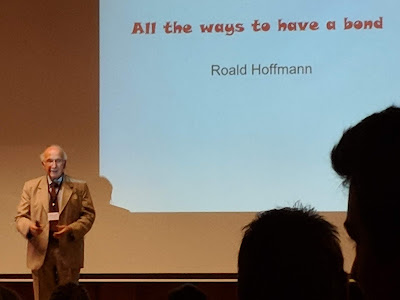Our annual 'international eliminator' for the Royal Society of Chemistry's Top of the Bench (ToTB) competition was held at the British School of Brussels (BSB) on Saturday 24 November 2018 with teams from Belgium, Luxembourg and the Netherlands taking part. In total 11 teams from 6 schools participated. An exciting afternoon of chemical problem solving ended with the announcement of the 2018 winner of the Keith Price Cup: Team Fluorine from BSB. They will now represent RSC Belgium at the TOTB grand final in the UK in 2019.
This year the competition was even closer than normal with a very, very close finish between team Fluorine and team Oxygen from St George's International School in Luxembourg.
Wining formula
The teams completed individual written question papers and then enjoyed a challenging team Practical Problem Solving Exercise. As usual both the 'hands-on' practical and the paper-based component were developed by our resident competition guru, Rita Woodward. The competition was designed to really test the teams’ chemistry knowledge and problem-solving abilities and (hopefully) encourage young talented chemical scientists to consider further education and careers in Chemistry.
The individual scores from the written paper were added together for each team with the placings from the practical session to give an overall score.
Members of the winning Fluorine team (pictured above) received our TOTB Keith Price Cup as well as some RSC goodies. All the student participants will receive a certificate.
Our huge thanks our committee judges Bob Crichton and Julie Tuppeny, and to all the teachers and other volunteers involved in preparing and organising the event, in particular Helen and William Darnley, Jane Downing, David Douheret and Greg Koc from BSB, and, of course, Rita.
TOTB 2018 line-up
The full list of participating teams for our 2018 competition was:
Lithium - European School Brussels 4 (Laeken)
Sulfur - European School Brussels 4 (Laeken)
Bromine - European School Brussels 2 (Woluwe)
Magnesium - European School Brussels 2 (Woluwe)
Vanandium - International School of Flanders (Rhode St Genese)
Copper - British School of Brussels (Tervuren)
Fluorine - British School of Brussels (Tervuren)
Chromium - United World Colleges (Maastricht)
Nitrogen - United World Colleges (Maastricht)
Calcium - St Georges International School (Luxembourg)
Oxygen - St Georges International School (Luxembourg)
The TOTB Finals will take place in the UK on 9 March 2019 at the University of Birmingham and RSC Belgium will sponsor the travel arrangements for our winning team. The RSC Belgium team is usually the only competing school team not based in the British Isles.
Our next TOTB Eliminator Round will take place in Q4 2019. Get your school involved!








































